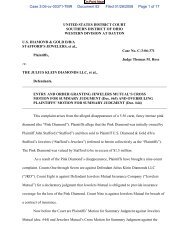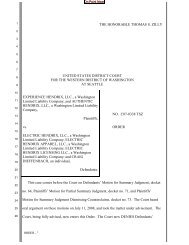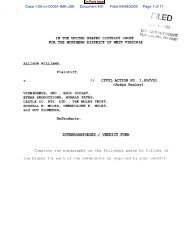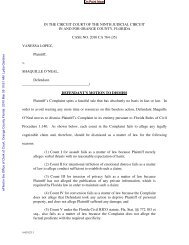GORDON KEENE VELLA. - On Point News
GORDON KEENE VELLA. - On Point News
GORDON KEENE VELLA. - On Point News
You also want an ePaper? Increase the reach of your titles
YUMPU automatically turns print PDFs into web optimized ePapers that Google loves.
(Pope Decl. 37.)<br />
Further, the bitter opposition over the theory of “dissociative amnesia” is very well<br />
documented within the scientific community.<br />
The profound absence of general acceptance of dissociative amnesia among the relevant<br />
scientific community was recently detailed in an Amicus brief to the Supreme Court of the State<br />
of California in Tau v. Loftus, 151 P.3d 1185 (Cal. 2007). In fact, “dozens and dozens of the<br />
most prominent mental health and social science professionals in the world on the issue of socalled<br />
‘repressed and recovered memories’” joined as Amici to demonstrate the lack of<br />
acceptance of the “dissociative amnesia” hypothesis was (Barden Decl. 12, Ex. 3-D.)<br />
Dr. Pope recently conducted his own study concerning the general acceptance of<br />
“dissociative amnesia” by asking 301 randomly chosen board-certified psychiatrists if they<br />
believed that “dissociative amnesia” should continue to be included in the American Psychiatric<br />
Association’s diagnostic manual, DSM-IV, as an official diagnosis. “<strong>On</strong>ly 35% of the<br />
psychiatrists responded that “dissociative amnesia” should be included as an official diagnosis<br />
without reservations, with 48% feeling that it should be included only with reservations (for<br />
example as a “proposed” diagnosis in the Appendix), 9% feeling that it should not be included at<br />
all, and 9% having no opinion.” (Pope Decl. 38, Ex. 8.) This study demonstrates that there is<br />
no general consensus amongst the relevant scientific community.<br />
In addition to the Dr. Pope study, numerous articles published over the last 15 years<br />
demonstrate widespread skepticism over the theory of “dissociative amnesia.” (Pope Decl., Ex.<br />
9.) Among the numerous articles is one entitled “Custer’s Last Stand: Brown, Scheflin, and<br />
Whitfield’s Latest Attempt to Salvage “Dissociative Amnesia”, which specifically addressed the<br />
claims of Dr. Brown himself. (Pope Decl., Ex. 10.) “In the face of these publications – none of<br />
- 22 -
















